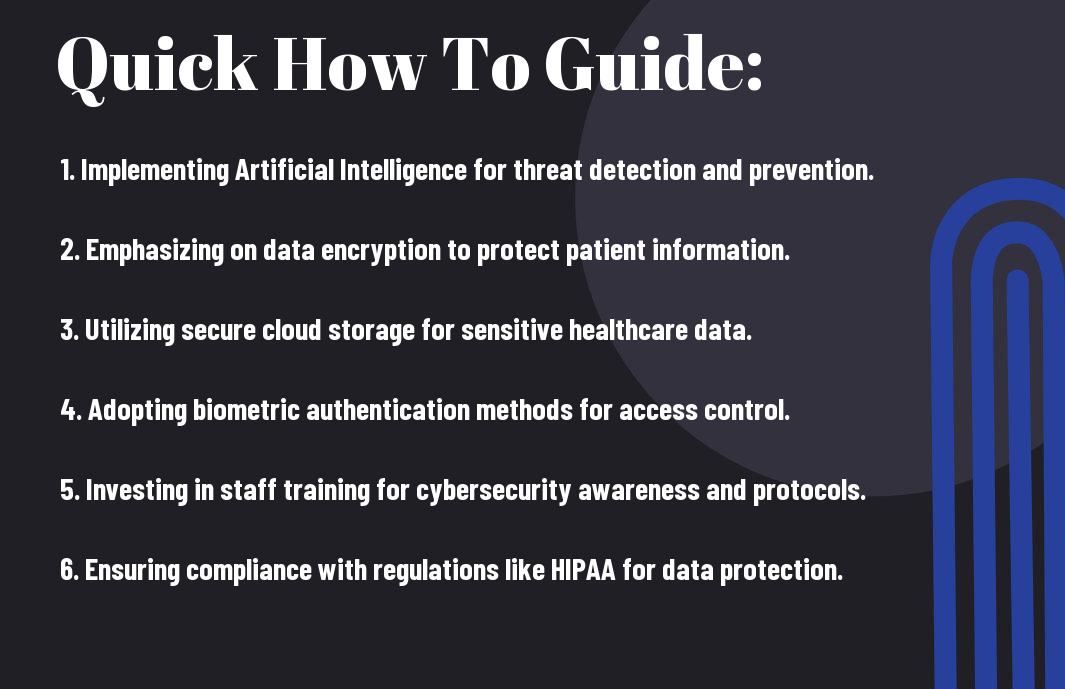What Cybersecurity Trends Are Shaping The Future Of Healthcare Cybersecurity in the healthcare industry is constantly evolving, with new threats and trends shaping the future landscape. In this blog post, I will discuss the important cybersecurity trends that are impacting healthcare organizations today. From ransomware attacks to data breaches, understanding these trends is crucial for protecting your sensitive patient information and maintaining the trust of your clients. Let’s explore the key cybersecurity trends that are shaping the future of healthcare.
Table of Contents

How to Protect Patient Data from Cyber Threats
Understanding the Importance of Encryption

To protect patient data from cyber threats, encryption is crucial. Encrypting sensitive information ensures that even if unauthorized individuals access the data, they cannot read or use it without the encryption key. Implementing encryption across your entire healthcare system adds an extra layer of security and minimizes the risk of data breaches.
Implementing Secure Authentication Protocols
To further enhance data security in healthcare, implementing secure authentication protocols is necessary. By requiring users to authenticate their identities through multiple factors such as passwords, biometrics, or security tokens, you can significantly reduce the risk of unauthorized access to patient information.
Protocols: Secure authentication protocols like two-factor authentication and biometric verification provide added layers of security to prevent unauthorized access. It is important to regularly update and strengthen these protocols to stay ahead of evolving cyber threats in the healthcare industry.
Tips for Healthcare Providers to Mitigate Cyber Attacks
Some cybersecurity measures are crucial for healthcare providers to reduce the risk of cyber attacks. Here are a few tips to help strengthen your cybersecurity defenses:
- Conduct regular security audits to identify vulnerabilities
- Educate staff on cybersecurity best practices
- Implement strong password policies and multi-factor authentication
- Keep software and systems up to date with the latest security patches
- Backup data regularly and ensure a robust disaster recovery plan
Though cyber attacks in the healthcare sector are on the rise, implementing these cybersecurity measures can significantly reduce your risk.

Conducting Regular Security Audits
Healthcare providers should regularly conduct security audits to assess their systems and identify any vulnerabilities. This proactive approach can help you address weak points in your cybersecurity defenses before they are exploited by malicious actors.
Educating Staff on Cybersecurity Best Practices
Educating your staff on cybersecurity best practices is crucial in fortifying your organization’s defenses. It is crucial that all employees are aware of the potential risks, such as phishing scams and malware attacks, and know how to safeguard sensitive patient data and health information.
Factors Influencing the Rise of Cybersecurity in Healthcare
Your healthcare organization needs to stay on top of cybersecurity trends to protect patient data and prevent cyber attacks. By understanding the factors that are driving the need for better cybersecurity measures in healthcare, you can better prepare and secure your systems. Recognizing these factors is key to staying ahead in the ever-evolving landscape of healthcare cybersecurity.
The Increasing Use of IoT Devices
There’s a growing reliance on IoT devices in healthcare, from smart medical devices to remote monitoring systems. While these devices offer convenience and efficiency, they also pose security risks due to their interconnected nature. It’s necessary to implement robust cybersecurity measures to protect sensitive patient data and prevent unauthorized access to these devices.
The Growing Threat of Ransomware Attacks
With the rise of ransomware attacks in the healthcare industry, it’s more important than ever to prioritize cybersecurity efforts. Attackers can encrypt critical patient data and demand hefty ransoms for its release, leading to significant financial losses and potential harm to patients. Regular backups, employee training, and cybersecurity solutions are crucial in mitigating the risks associated with ransomware attacks.
How to Develop a Comprehensive Cybersecurity Strategy
Identifying Vulnerabilities in Healthcare Infrastructure
Now, when developing a cybersecurity strategy for healthcare, the first step is to identify vulnerabilities in the infrastructure. This involves conducting thorough assessments of systems, networks, and endpoints to pinpoint weak points that could be exploited by cyber threats.
Implementing Incident Response Plans
You need to have robust incident response plans in place to effectively mitigate and manage cybersecurity incidents when they occur. This includes protocols for containing threats, communicating with stakeholders, and restoring systems and data. By having a well-prepared incident response plan, you can minimize the impact of a cyberattack on your organization.
This process is crucial for safeguarding sensitive patient data and maintaining the trust of your patients. Timely response and effective containment of cyber threats can prevent data breaches and other damaging consequences. It’s important to regularly test and update your incident response plans to ensure they remain effective as cyber threats evolve.
Conclusion
Now, as I reflect on the cybersecurity trends shaping the future of healthcare, I realize the critical importance of staying ahead of threats to protect patient data. By implementing robust security measures, continuously training staff, and adopting advanced technologies, you can safeguard your organization against cyber attacks and ensure the trust and safety of your patients’ sensitive information.
Q: What are some key cybersecurity trends in the healthcare industry?
A: Some key cybersecurity trends in healthcare include the increased adoption of artificial intelligence and machine learning for threat detection, the focus on securing Internet of Things (IoT) devices in medical environments, and the emphasis on user training and awareness to prevent phishing attacks.
Q: How does the shift towards telemedicine impact healthcare cybersecurity?
A: The shift towards telemedicine introduces new challenges for healthcare cybersecurity, as it expands the attack surface with more devices and connections. Healthcare organizations need to implement secure telehealth platforms, encrypt data transmission, and ensure compliance with privacy regulations like HIPAA.
Q: What measures can healthcare organizations take to enhance their cybersecurity posture?
A: Healthcare organizations can enhance their cybersecurity posture by conducting regular security assessments, implementing multi-factor authentication, encrypting sensitive data, training employees on cybersecurity best practices, maintaining up-to-date software and security patches, and partnering with cybersecurity experts for proactive monitoring and incident response.
